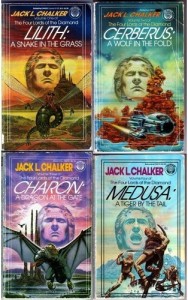 Greetings, my dear inklings! I come to you today bearing tidings of the sci-fi nature. “Sci-fi nature” — is that an oxymoron? No matter! (Anti, dark, or otherwise.) What’s on my mind today is that I’m reading a terrific book right now, and I’m going to attempt to tell you about it without giving away too much of the fantastically cool plot.
Greetings, my dear inklings! I come to you today bearing tidings of the sci-fi nature. “Sci-fi nature” — is that an oxymoron? No matter! (Anti, dark, or otherwise.) What’s on my mind today is that I’m reading a terrific book right now, and I’m going to attempt to tell you about it without giving away too much of the fantastically cool plot.
Jack L. Chalker’s novel The Four Lords of the Diamond is a classic sci-fi tale with robots, aliens, utopias, dystopias, genetic engineering (What self-respecting u-/dystopia wouldn’t have that?), genetic mutation, telepathy, and space travel. There’s a main character you can’t help but feel for, what with his getting mind-wiped all the time. And you spend the whole story wondering if the good guys and bad guys are really who the seem to be.
Or, rather, you spend the whole stories wondering. Chalker’s novel is, in fact, four novellas in one:
Lilith: A Snake in the Grass
Cerberus: A Wolf in the Fold
Charon: A Dragon at the Gate
Medusa: A Tiger by the Tail
Lilith, Cerberus, Charon, and Medusa are four planets. All four stories take place more or less at the same time, and all four revolve around the same main character. I’d like to tell you the poor man’s name, but I can’t. He has four. Or maybe it’s five. I’m not sure. And if I tell you much more than what I’ve already said, I’m going to be giving away too much of the plot.
Let’s just say that to write this novel, Chalker had to start four very different stories exactly the same way. And gah! I just told you too much! I know some of you have already guessed what I’m talking about. Ah well, I’ll just have to trust that you’ll still want to read the book for yourselves and, when you do read it, that you’ll have forgotten all the little hints I dropped.
Anyway. I’m currently a few dozens pages into Charon: A Dragon at the Gate and enjoying myself immensely. But not only is this a great romp of a sci-fi story, it’s also making me reevaluate an entire character in my work-in-progress.
Because of how Chalker uses point-of-view in his novel(s), he’s reminding me that knowing a character’s backstory and motivations is essential to giving that character life. Without all of that behind-the-scenes information, a character will be forever flat. I don’t even have to share all of that background information with the reader; the results of it will come out in the story. But even if I don’t share it, I have to know it. If I haven’t worked it out in prewriting, I won’t be able to make that character shine.
The POV of Chalker’s unusual main character also inspires me to think about how sometimes, the character we think will shine the brightest actually ends up taking a backseat to another, lesser character. I’m talking about the sidekick who’s wittier than the hero, or the best friend who’s spunkier than the heroine. Sometimes, the story is just plain better when we view it through the eyes of a supporting character. Sometimes, it’s more interesting. Sometimes, it’s more fun. And it’s definitely more effective at capturing first the reader’s attention and then the reader’s heart.
So the lessons are these:
Know your character,
and know which character your story needs.
My current work-in-progress is the third in a young adult paranormal trilogy. Each novel in the trilogy has had a different main character, and for this third one, the MC is Anne. I have no problem with Anne. I love Anne. She might just be my favorite MC of the series; time will tell. But I do have a problem with Nora.
Nora is mostly a sidekick character, but she thinks she’s a main character. She doesn’t have a lot to say. When she does speak, she’s kind of whiny. When she opens her mouth, the first thought that pops into my head is, Oh, no. Not her again. And I’m starting to wonder if maybe Daniel could do and say everything Nora is doing and saying at this point.
I like Daniel. He’s kind of a jerk, but he knows his stuff. I like him…and so, I’m starting to consider cutting Nora out of the story entirely. It wouldn’t take too much re-writing to give her whole part to Dan the Man. (I promise, I don’t really call him that in the story.) Besides, Owin wouldn’t like it if Daniel played Nora’s role in Anne’s life — and that drama might be too juicy to resist.
I’m writing this story entirely from Anne’s POV — but Nora’s POV still shines through, because Nora is a reference point for Anne. But is she a necessary reference point? Would my storytelling be more efficient without her? Would the story sparkle more?
Thanks to Mr. Chalker, I’m starting to think that the answer to the latter two questions is yes.
And that’s WILAWriTWe!






[…] work(s)-in-progress update, which, if my calculations search functions are correct, I have not done since February. Fortunately for us all, a WsIP update also qualifies as a WILAWriTWe, because part of learning […]